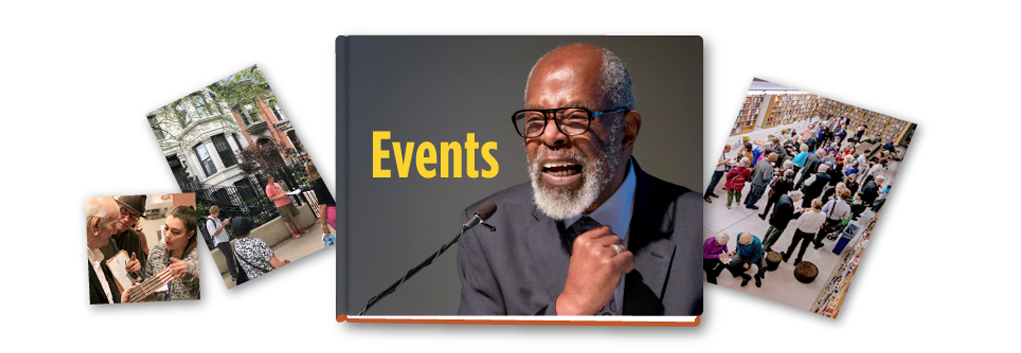Division Street Revisited Podcast Launches at Winter Garden
Friday, January 31, 2025
by Donald G. Evans
When you observe the Harold Washington Library’s monstrous dome from street level, or even above, it strikes you, in the context of all those green 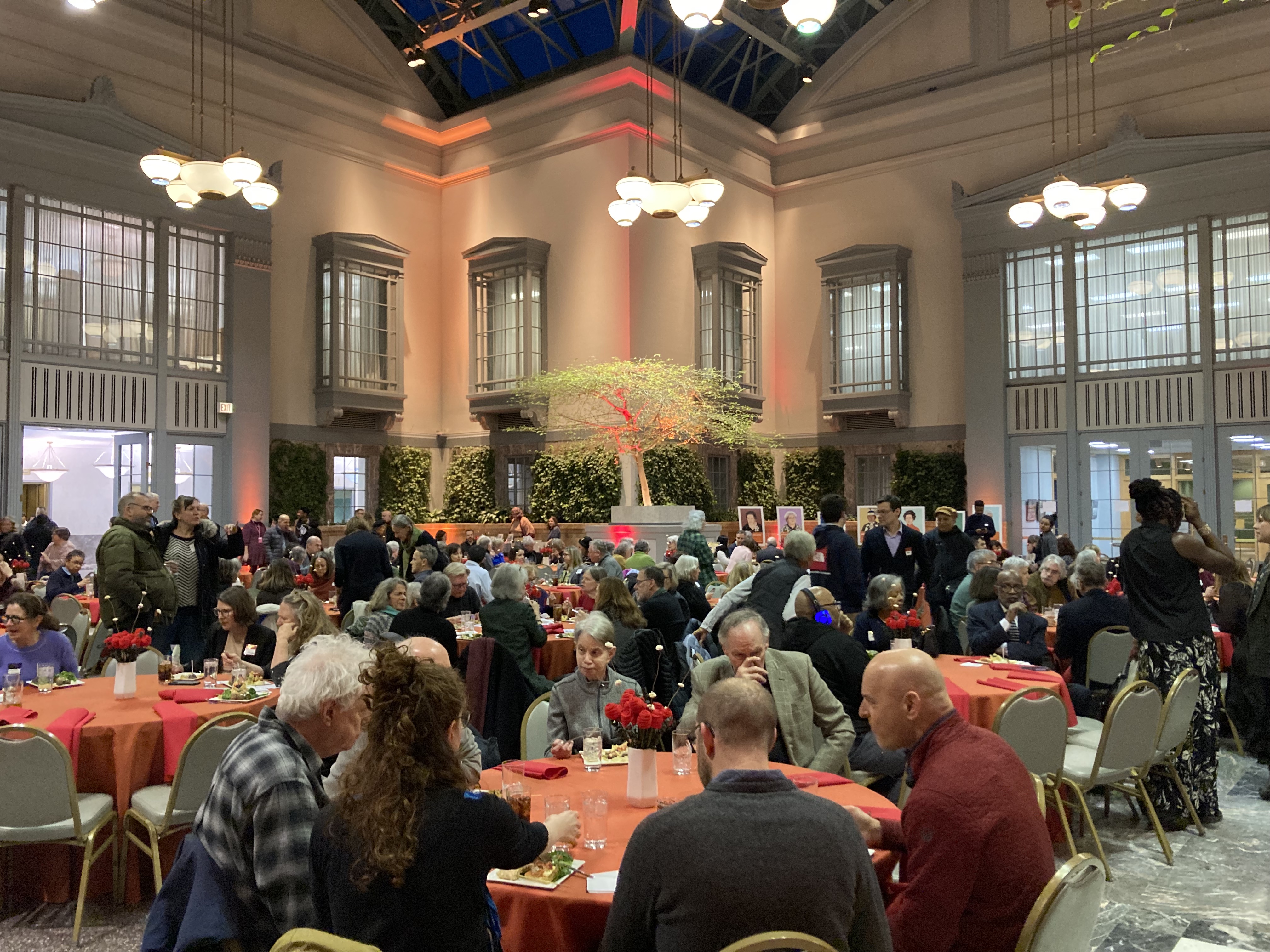 Great Horned Owls, as a bit odd. Standing in the Winter Garden, where the dome serves as a glass ceiling, you understand. The Winter Garden is one of Chicago’s glorious, special places, a place Studs Terkel knew intimately. It splits the difference between cozy and ornate, a sun-drenched space filled with impressive architectural detail as well as inspiring displays of fine art. Of course, Studs knew much of Chicago intimately. From his humble roots, he rose through our gritty streets to become, in his own words, “celebrated for celebrating the uncelebrated.” He seemed as comfortable in posh, Winter Garden settings as in dank, divy spots, though his allegiance remained with the latter.
Great Horned Owls, as a bit odd. Standing in the Winter Garden, where the dome serves as a glass ceiling, you understand. The Winter Garden is one of Chicago’s glorious, special places, a place Studs Terkel knew intimately. It splits the difference between cozy and ornate, a sun-drenched space filled with impressive architectural detail as well as inspiring displays of fine art. Of course, Studs knew much of Chicago intimately. From his humble roots, he rose through our gritty streets to become, in his own words, “celebrated for celebrating the uncelebrated.” He seemed as comfortable in posh, Winter Garden settings as in dank, divy spots, though his allegiance remained with the latter.
Chicago still celebrates Studs, though it’s been more than 16 years since his death at age 96. He was already almost 55 years old when his first book, Division Street, was published in 1967. Until then, Studs’ medium was radio, in particular his popular public radio show, The Studs Terkel Program, which garnered big audiences and acclaim starting in 1952 (it would run until 1997).
Division Street was a revelation as much as it was a sensation. It made the bestseller list and won applause from respected national publications. Beyond that, it reconfigured the way a lot of people thought about storytelling. As former Chicago Tribune columnist Mary Schmich says in the first episode of the new podcast, Division Street Revisited, Studs was “a Chicago guy who turned oral history into a literary form.”
Last Wednesday, January 29, Schmich and her many collaborators hosted about 400 people in the Winter Garden for the Division Street Revisited launch. In sync with the dropping of that first episode ("Myra Alexander: Never Too Old to be Free"), Schmich and Melissa Harris led a program that provided context and insight into the exciting project. The two worked together at the Chicago Tribune. Harris, now CEO of the marketing firm M. Harris & Co., hatched the idea for this podcast and recruited Schmich as host and co-executive producer. In some ways, it was a victory lap for their accomplishment. There were many professions of gratitude for donors, collaborators, and subjects. But this program managed to do what I believe it wanted to do: announce this podcast as a real happening and also revel in the spirit of the project, which centers so much on generational connectivity.
Several guests seated at round tables throughout the solarium wore headsets, listening, as they sampled the free buffet dinner offerings, to the first episode. We consume podcasts, generally speaking, like most modern-day “content,” namely we do it on our own schedule. At this launch, there was an urgency to get to that content now, in real time.
Those who listened in advance to the first episode already knew the basics. This would be a series that resurrected seven of Studs’ original 71 Division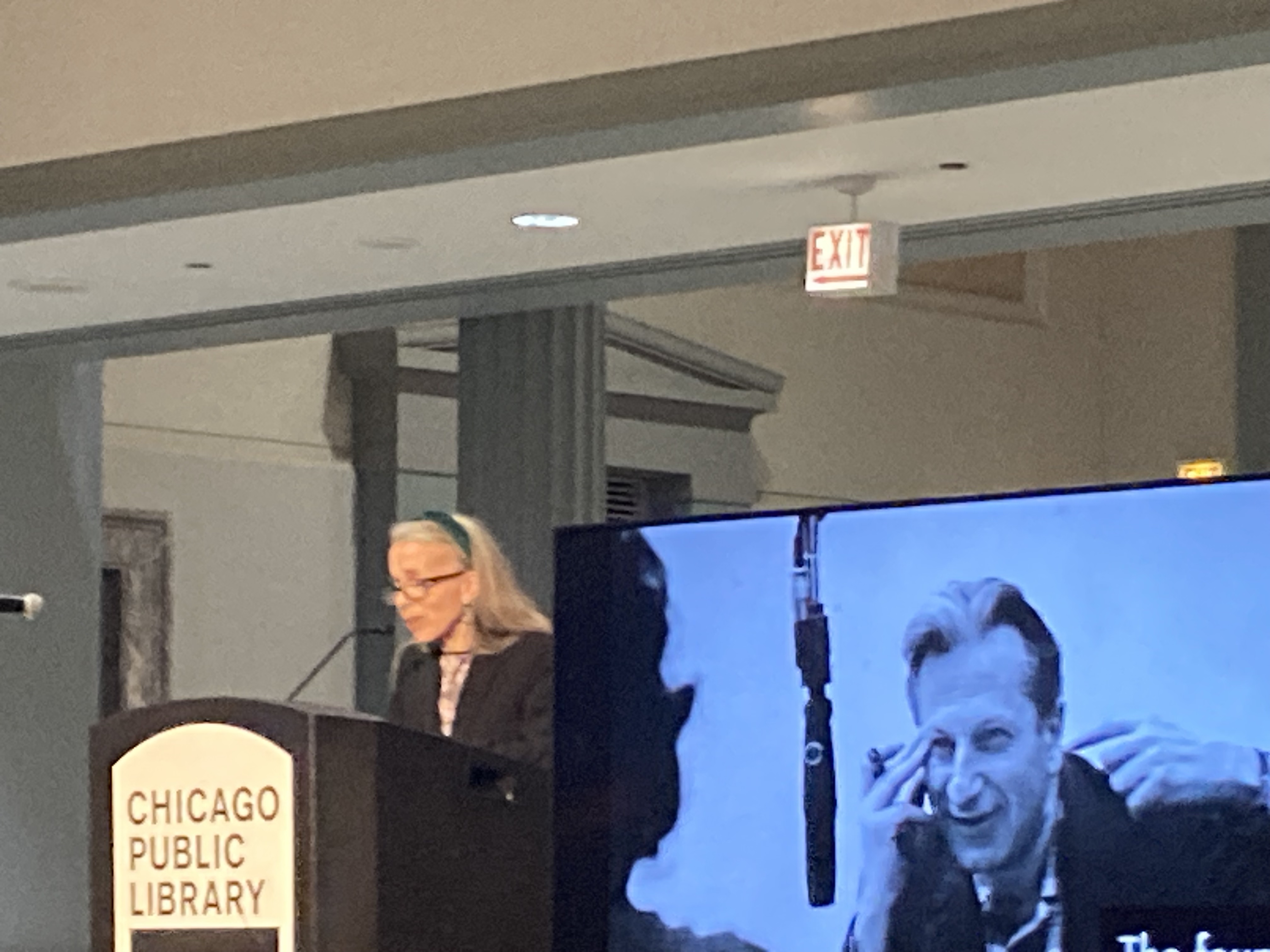 Street stories, starting with Myra Alexander. The podcast would investigate the genealogy of those now-gone original subjects, track them down, and interview them about their lives in relation to their forebearers. The series would explore, “How their perspective can give us perspective on our lives.”
Street stories, starting with Myra Alexander. The podcast would investigate the genealogy of those now-gone original subjects, track them down, and interview them about their lives in relation to their forebearers. The series would explore, “How their perspective can give us perspective on our lives.”
Schmich, a-three-time Pulitzer Prize winner (Feature Writing in 2006 and Commentary in 2011 and 2012), knew Studs, himself a Pulitzer Prize winner (General Nonfiction in 1985 for The Good War). Not real well, according to Schmich, but well enough to have a few intimate dinners with him. At one such dinner, Studs lamented that he could not find the lyrics to the song that would lend its title to his work-in-progress, Will the Circle Be Unbroken? Schmich pointed out that the lyrics were surely available online. Studs grumpily (to judge by Schmich’s imitation) declared that he didn’t use computers. So Schmich went upstairs, googled the lyrics, printed them out, and presented them to Studs. In thanks, Studs listed Schmich in the acknowledgements when the book came out in the fall of 2001.
Hearing Schmich tell this scripted anecdote in an off-the-cuff manner gave us a glimpse into the qualities that make her ideally suited to host this podcast. She’s articulate, smart, experienced, prepared, and blessed with an enchanting voice. The program was orchestrated in a thoughtful manner with quality speakers, and each segment further illuminated our appreciation for the project. It made us want to listen. Now.
Harris read Division Street on the recommendation of her colleague, Rick Kogan. Schmich hadn’t read the book until Harris approached her about the project. Ultimately, the stories Studs told in that book resonated and stuck with Schmidt, as they had with Harris. As Schmich says in that first episode of the 71 subjects, “Each one was a miniature portrait of a person; together they created a picture of the 1960s.”
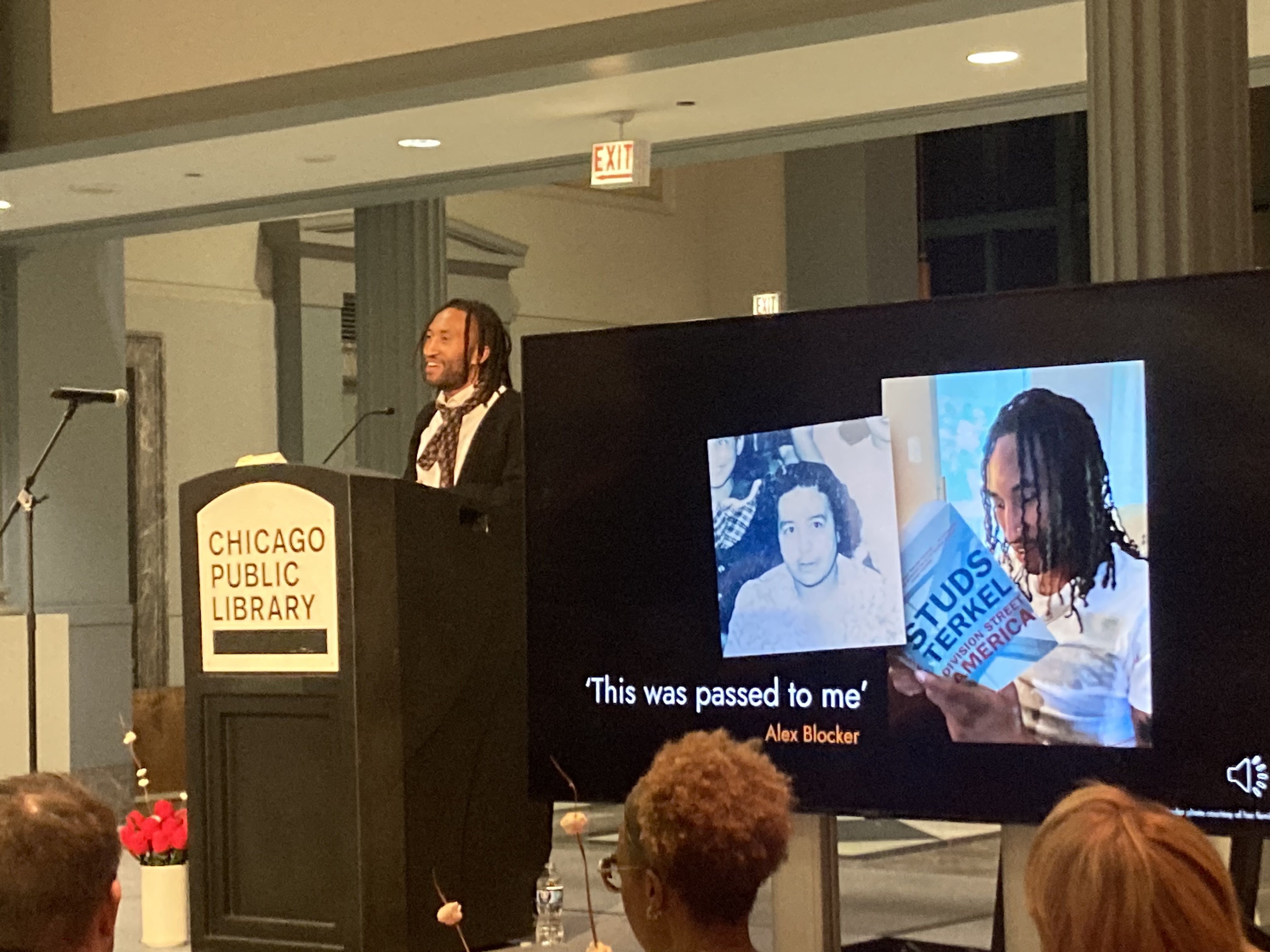
Alex Blocker, the great grandson of Myra Alexander, delivered an energetic speech that mirrored some of his interview in the first episode. In his speech, as in the first episode, Blocker credited his great grandmother for his own activism, though he’d been unaware of it until he became a subject. Schmich narrates in that first episode, “almost instantly I have an uncanny feeling of witnessing Myra resurrected, only she’s come back as a young man with tattoos, a nose ring, and streaks of blue in his hair.” One of the really fun and effective features of the podcast are Studs’ recordings of the original subjects. Division Street Revisited blends those archival clips with brand new audio, showing a deliberate arc connecting this last half-decade.
The program used visual aids to show the vast territory covered in the project. It reinforced themes like “this was passed to me.” We were introduced to the talented crew of collaborators, like Bill Healy, another Pulitzer Prize winner (Audio Reporting, 2024). There were several musical interludes, including a song by Blocker, a professional violist and teacher of the instrument.
Revisiting these subjects (or a fraction of them) presumably will create a portrait of 2025. Schmich shared that "Will the Circle Be Unbroken?" became a theme throughout the production work as well as the podcast. Chris Walz, who is associated with sponsor Old Town School of Folk Music, created original music for the podcast. He led a sing-along of the song to conclude the evening and underscore the idea that we’re all connected. Blocked accompanied on violin. Though the crowd only barely participated in the sing-along, it still captured the spirit of the project.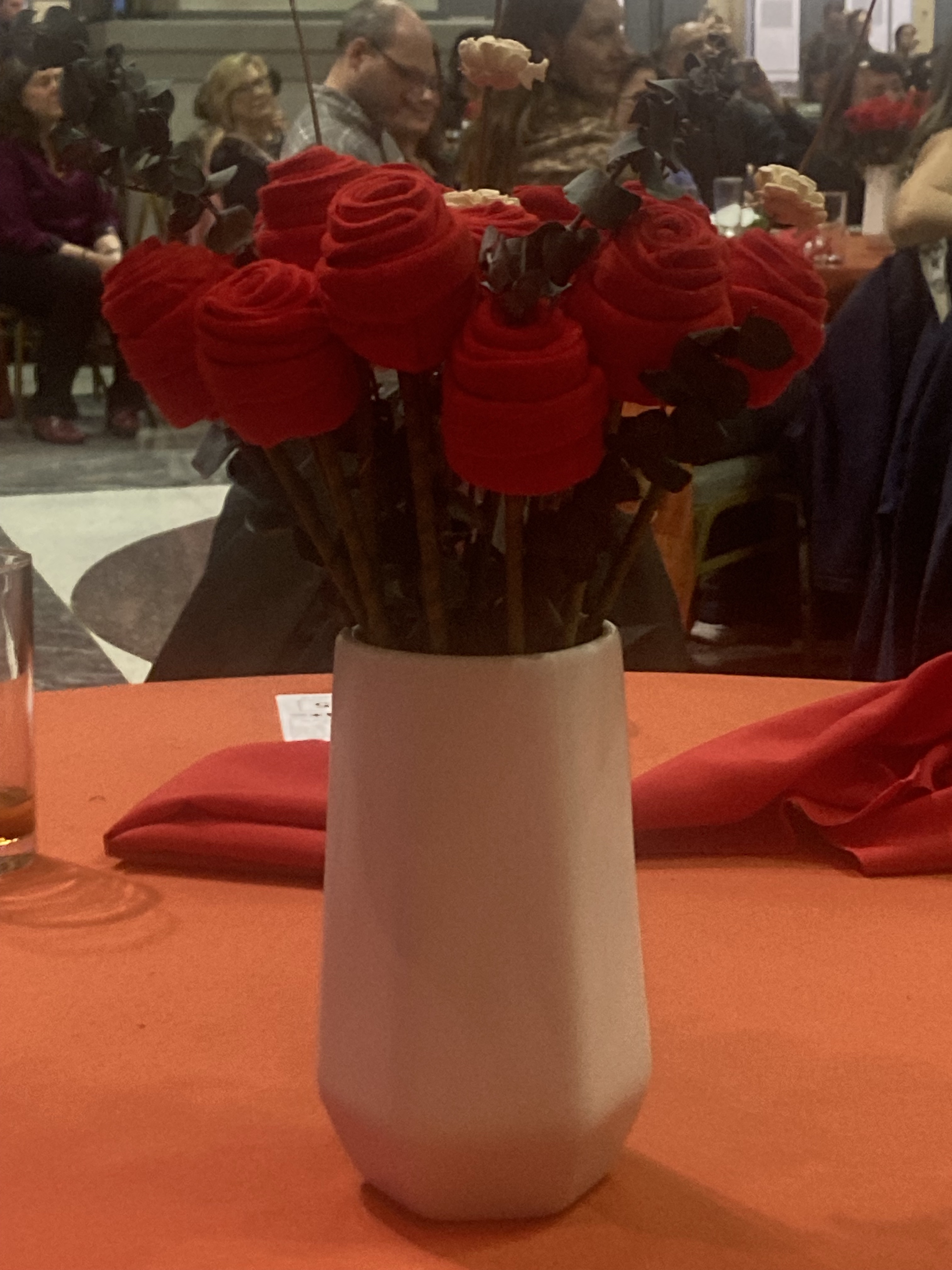 From my seat in the corner, I saw Alex Kotlowitz, Ben Austen, and Ethan Michaeli—a trio of Chicago’s most important, gifted nonfiction storytellers—offering their support. I could see historians, librarians, teachers, musicians, and so many others that surely admired Studs’ work and were enthusiastic about this new work. The light in that Winter Garden was splendid, as always. We were encouraged to take two “roses” from our place settings—hand-rolled red socks that paid homage to Studs’ signature fashion preference. I got the feeling that most everybody there would make a more-or-less beeline to that first podcast, and the others to follow. And then binge new episodes on the mharris.com website, as they become available.
From my seat in the corner, I saw Alex Kotlowitz, Ben Austen, and Ethan Michaeli—a trio of Chicago’s most important, gifted nonfiction storytellers—offering their support. I could see historians, librarians, teachers, musicians, and so many others that surely admired Studs’ work and were enthusiastic about this new work. The light in that Winter Garden was splendid, as always. We were encouraged to take two “roses” from our place settings—hand-rolled red socks that paid homage to Studs’ signature fashion preference. I got the feeling that most everybody there would make a more-or-less beeline to that first podcast, and the others to follow. And then binge new episodes on the mharris.com website, as they become available.
Donald G. Evans is the Founding Executive Director of the Chicago Literary Hall of Fame. He’ll be leading a craft workshop on Chicago short stories this spring. Those interested in writing and critiquing stories set in Chicago should register now.


